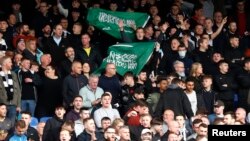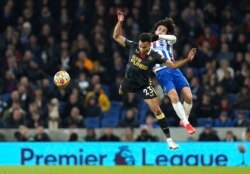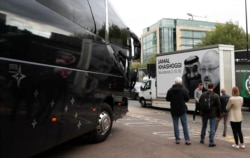Fans of England’s Crystal Palace soccer club were in a taunting mood. They unfurled a banner in the stands at the team’s stadium in south London during a match against Newcastle United, mocking their rivals’ new owner — the Crown Prince of Saudi Arabia, who was portrayed wielding a blood-stained scimitar.
The banner included a mock-up of the pseudo-categories the Palace fans suggested English football authorities require of owners of the country’s top soccer teams. The requirements included terrorism, beheadings, civil rights abuses and murder, and they were ticked off on a clipboard in the banner under the heading “Premier League Owners Test.”
Following complaints about racism, Britain’s Metropolitan Police launched an investigation, saying in a statement, “Any allegations of racist abuse will be taken very seriously.” This month police announced they don’t intend to pursue any prosecutions. “Following an assessment, officers have concluded that no offenses have been committed. No further action will be taken,” the police said in a press statement.
But the $415 million purchase of Newcastle United in October by a Saudi Arabia-led consortium has drawn fire and is fueling a wider debate about England’s premier soccer league, which is not only the richest and most-watched league in the world of football but also seemingly a magnet for oligarchs, authoritarian regimes and autocrats, say critics.
Two of the Premier League’s 20 teams — Manchester City and now Newcastle — are owned by authoritarian regimes. Two others — Chelsea and Wolverhampton Wanders — are owned by oligarchs with links to autocratic regimes. And another, Southampton, is owned by a Chinese businessman whose eventually successful bid for the team was held up as English football authorities probed bribery and corruption allegations lodged against him in China.
Some sponsorship tie-ups have also raised eyebrows. Earlier this year Arsenal signed an extension on a partnership deal with the Rwanda Development Board (RDB) which will see the club earn $55 million between now and 2025 for a “Visit Rwanda” logo on the left sleeve of the players.
The country’s ruling Rwandan Patriotic Front (RPF) has come under mounting criticism from international rights campaigners for threatening those who criticize the party. Human Rights Watch has documented from local sources “arbitrary detention, ill-treatment, and torture in official and unofficial detention facilities.”
Amnesty International has criticized the Saudi buyout of Newcastle, saying the deal is “a clear attempt by the Saudi authorities to sportswash their appalling human rights record with the glamour of top-flight football.”
In February, U.S. intelligence agencies concluded in a report that Crown Prince Mohammed bin Salman approved the 2018 killing of dissident journalist Jamal Khashoggi, who was killed in Istanbul while visiting the Saudi consulate there and his body was cut up. In the report, the agencies alleged the prince approved a plan to either “capture or kill” Khashoggi. Saudi Arabia rejected the report, calling it “negative, false and unacceptable.
Premier League officials say that they received assurances that the Saudi authorities will not be involved in the day-to-day running of Newcastle.
But Amnesty UK’s chief executive, Sacha Deshmukh, told reporters, “Instead of allowing those implicated in serious human rights violations to walk into English football simply because they have deep pockets, we’ve urged the Premier League to change their owners’ and directors’ test to address human rights issues.”
The rights group wants a new human rights-compliant test to be at the heart of approving bids for clubs.
England’s football supporters tend to be ambivalent about foreign owners buying their beloved clubs — often critical when a takeover deal is first announced but then delighted when the funding from deep pockets powers their team to success.
Sheikh Mansour bin Zayed Al Nahyan, a member of Abu Dhabi’s royal family and deputy prime minister of the United Arab Emirates, bought Manchester City in 2008 and since then is estimated to have spent nearly $3 billion on buying top-flight players and coaching staff. Under his majority ownership the team has won the Premier League five times.
Newcastle fans, though, had no hesitation in celebrating the purchase of their team, which has had little success in recent years and is currently second from last in the league. Chelsea, owned by Roman Abramovich, a Russian oligarch with close ties to President Vladimir Putin, is on top of the league currently, with Manchester City second. As with Manchester City, so with Chelsea — under Abramovich’s ownership the team has been turned into a football Goliath.
Fans at Newcastle's St James' Park Stadium, in northeast England, were jubilant when the Saudi deal was announced last month, saying they hoped it would mark a turnaround for the club. Fans waved Saudi flags and donned mock Saudi-style ghutras (headscarves).
Lawmaker John Nicolson, a member of the British parliament’s Digital, Culture, Media and Sport committee, condemned the scenes during a panel hearing shortly after the deal was made public. During a committee hearing he said, “I'm trying to imagine what it must be like to be Jamal Khashoggi's widow, when her husband has been chopped up and murdered. And she sees numpties (silly people) dancing around in cod-Arabic dresses outside Newcastle United.”






